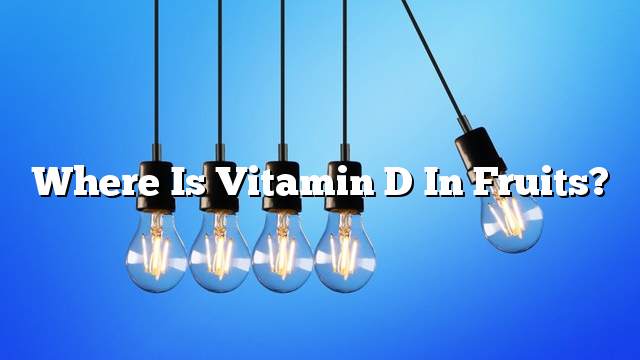Vitamin D
Vitamin D is a fat-soluble vitamin that is naturally found in very few foods but can be added artificially to some types of foods. The body produces vitamin D when the skin is exposed to ultraviolet rays that stimulate the formation of this vitamin, Vitamin D is available as a dietary supplement.
Vitamin D in fruits
There is no vitamin D in fruit, and in fact there is no vitamin D in plant sources except mushrooms and fortified foods, and the most important sources will be mentioned.
Sources of Vitamin D
Sun rays
Spending some time outdoors for sun exposure in the summer is the best way to get a daily dose of vitamin D. However, nearly 50% of the world’s population is not exposed to sunlight, because people spend most of their time away from home. Sun rays, sunscreen, and a balanced diet that contains foods rich in vitamin D. Many factors greatly influence the body’s ability to produce vitamin D, such as:
The hands and legs should be exposed to the sun for 5 to 30 minutes between 10 am and 3 pm, usually enough to meet the daily needs of most light-skinned people. The darker skin will last longer. Summer is enough to ensure good levels of vitamin D during the winter, regardless of getting vitamin D from other sources.
Foods rich in vitamin D.
Some foods naturally contain varying amounts of vitamin D. The following is a statement:
- Salmon: It is a type of fatty fish rich in vitamin D, which contains (100 g) of salmon on (361-685 IU) of vitamin D.
- sardine: Contains two cans of canned sardine (46 IU).
- Cod liver oil: It contains a teaspoon (4.9 ml) on 450 IU and is a rich source of vitamin A and omega-3 fatty acids. Cod liver oil is one of the supplements, so it should be used with caution and no more than recommended intake.
- tuna fish: It contains 100 grams of canned tuna (236 IU), tuna is rich in vitamin B3 and vitamin K, but is often contaminated with methylmercury, which causes many health problems.
- Oysters: 100 g of Oysters contains 320 IU and is rich in vitamin B12, copper and zinc.
- yolk: One egg yolk contains approximately 30 IU of vitamin D.
- Mushrooms: Mushroom is the only plant source of vitamin D as we mentioned, and the fungus produces vitamin D when exposed to ultraviolet light during its growth.
Foods fortified with vitamin D
Because the natural sources of vitamin D are very limited, especially if the person is a vegetarian; some foods have been fortified with vitamin D, including the following:
- Bovine Milk: One cup (237 ml) of vitamin D fortified milk contains 130 IU of vitamin D.
- Orange juice: One cup (237 ml) of fortified orange juice contains about 142 IU of vitamin D.
- Some types of grain: Half a cup of vitamin D-fortified grains contains 55-44 IU of vitamin D.
The body’s needs for vitamin D.
The following table shows the recommended amount of vitamin D (RDA) needed to meet the needs of the human body by age group:
| Age | Reference food quantity (IU / day) |
|---|---|
| 12-0 months | 400 |
| 70-1 years | 600 |
| Greater than 70 years | 800 |
Benefits of vitamin D for the body
Vitamin D is an important element in maintaining the health of the body in many ways. The benefits of getting enough vitamin D are as follows:
- Maintaining bone health: The body needs vitamin D to absorb calcium and phosphorus – which play a key role in maintaining bone health – from the bowel efficiently. This may explain why vitamin D deficiency leads to rickets in children, Osteopalacia or osteoporosis in adults.
- Reduce the risk of influenza.
- Reduce the risk of diabetes. Vitamin D deficiency negatively affects insulin secretion and glucose tolerance in people with type 2 diabetes. A study found that approximately 2000 IU of vitamin D was taken by infants Daily reduces the risk of type 1 diabetes.
- Cancer prevention: Vitamin D significantly affects the regulation and proper growth of cells, slowing down the development of cancer by slowing the growth and development of blood vessels that feed cancerous tissues, thereby increasing the chance of cancer cells dying, reducing their chances of proliferation, and spreading them in the body. A process known as metastasis or cancer cell migration.
- Reduce the risk of multiple sclerosis.
- Combating many diseases: As vitamin D positively affects the immune system, vitamin D deficiency is associated with an increased risk of cardiovascular disease, hypertension, Alzheimer’s, rheumatoid arthritis, and asthma.
- Improve mood and prevent depression.
